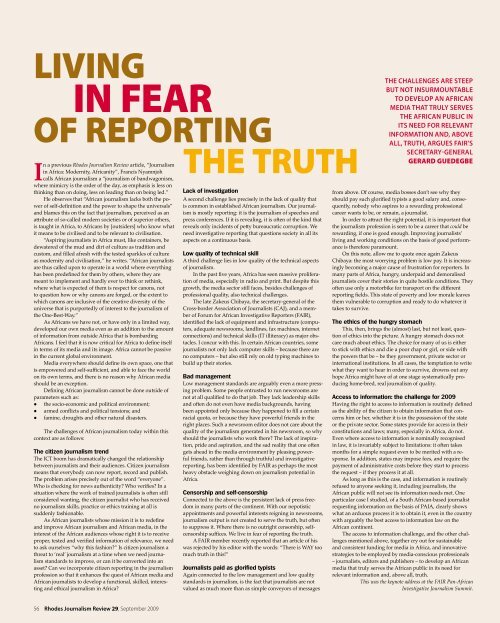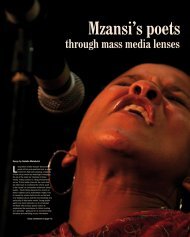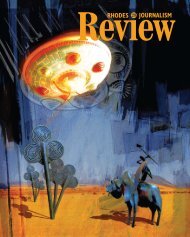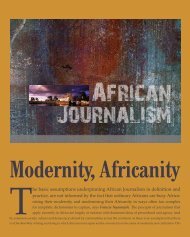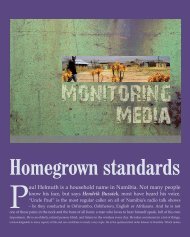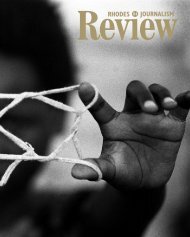Riding on the cup: - Rhodes Journalism Review - Rhodes University
Riding on the cup: - Rhodes Journalism Review - Rhodes University
Riding on the cup: - Rhodes Journalism Review - Rhodes University
You also want an ePaper? Increase the reach of your titles
YUMPU automatically turns print PDFs into web optimized ePapers that Google loves.
livinG<br />
in fear<br />
of reporTinG<br />
In a previous <strong>Rhodes</strong> <strong>Journalism</strong> <strong>Review</strong> article, “<strong>Journalism</strong><br />
in Africa: Modernity, Africanity”, Francis Nyamnjoh<br />
calls African journalism a “journalism of bandwag<strong>on</strong>ism,<br />
where mimicry is <strong>the</strong> order of <strong>the</strong> day, as emphasis is less <strong>on</strong><br />
thinking than <strong>on</strong> doing, less <strong>on</strong> leading than <strong>on</strong> being led.”<br />
He observes that “African journalism lacks both <strong>the</strong> power<br />
of self-definiti<strong>on</strong> and <strong>the</strong> power to shape <strong>the</strong> universals”<br />
and blames this <strong>on</strong> <strong>the</strong> fact that journalism, perceived as an<br />
attribute of so-called modern societies or of superior o<strong>the</strong>rs,<br />
is taught in Africa, to Africans by [outsiders] who know what<br />
it means to be civilised and to be relevant to civilisati<strong>on</strong>.<br />
“Aspiring journalists in Africa must, like c<strong>on</strong>tainers, be<br />
dewatered of <strong>the</strong> mud and dirt of culture as traditi<strong>on</strong> and<br />
custom, and filled afresh with <strong>the</strong> tested sparkles of culture<br />
as modernity and civilisati<strong>on</strong>,” he writes. “African journalists<br />
are thus called up<strong>on</strong> to operate in a world where everything<br />
has been predefined for <strong>the</strong>m by o<strong>the</strong>rs, where <strong>the</strong>y are<br />
meant to implement and hardly ever to think or rethink,<br />
where what is expected of <strong>the</strong>m is respect for can<strong>on</strong>s, not<br />
to questi<strong>on</strong> how or why can<strong>on</strong>s are forged, or <strong>the</strong> extent to<br />
which can<strong>on</strong>s are inclusive of <strong>the</strong> creative diversity of <strong>the</strong><br />
universe that is purportedly of interest to <strong>the</strong> journalism of<br />
<strong>the</strong> One-Best-Way.”<br />
As Africans we have not, or have <strong>on</strong>ly in a limited way,<br />
developed our own media even as an additi<strong>on</strong> to <strong>the</strong> amount<br />
of informati<strong>on</strong> from outside Africa that is bombarding<br />
Africans. I feel that it is now critical for Africa to define itself<br />
in terms of its media and its image. Africa cannot be passive<br />
in <strong>the</strong> current global envir<strong>on</strong>ment.<br />
Media everywhere should define its own space, <strong>on</strong>e that<br />
is empowered and self-sufficient, and able to face <strong>the</strong> world<br />
<strong>on</strong> its own terms, and <strong>the</strong>re is no reas<strong>on</strong> why African media<br />
should be an excepti<strong>on</strong>.<br />
Defining African journalism cannot be d<strong>on</strong>e outside of<br />
parameters such as:<br />
● <strong>the</strong> socio-ec<strong>on</strong>omic and political envir<strong>on</strong>ment;<br />
● armed c<strong>on</strong>flicts and political tensi<strong>on</strong>s; and<br />
● famine, droughts and o<strong>the</strong>r natural disasters.<br />
The challenges of African journalism today within this<br />
c<strong>on</strong>text are as follows:<br />
The citizen journalism trend<br />
The ICT boom has dramatically changed <strong>the</strong> relati<strong>on</strong>ship<br />
between journalists and <strong>the</strong>ir audiences. Citizen journalism<br />
means that everybody can now report, record and publish.<br />
The problem arises precisely out of <strong>the</strong> word “every<strong>on</strong>e”.<br />
Who is checking for news au<strong>the</strong>nticity? Who verifies? In a<br />
situati<strong>on</strong> where <strong>the</strong> work of trained journalists is often still<br />
c<strong>on</strong>sidered wanting, <strong>the</strong> citizen journalist who has received<br />
no journalism skills, practice or ethics training at all is<br />
suddenly fashi<strong>on</strong>able.<br />
As African journalists whose missi<strong>on</strong> it is to redefine<br />
and improve African journalism and African media, in <strong>the</strong><br />
interest of <strong>the</strong> African audiences whose right it is to receive<br />
proper, tested and verified informati<strong>on</strong> of relevance, we need<br />
to ask ourselves “why this fashi<strong>on</strong>?” Is citizen journalism a<br />
threat to ‘real’ journalism at a time when we need journalism<br />
standards to improve, or can it be c<strong>on</strong>verted into an<br />
asset? Can we incorporate citizen reporting in <strong>the</strong> journalism<br />
professi<strong>on</strong> so that it enhances <strong>the</strong> quest of African media and<br />
African journalists to develop a functi<strong>on</strong>al, skilled, interesting<br />
and ethical journalism in Africa?<br />
56 <strong>Rhodes</strong> <strong>Journalism</strong> <strong>Review</strong> 29, september 2009<br />
The TrUTh<br />
Lack of investigati<strong>on</strong><br />
A sec<strong>on</strong>d challenge lies precisely in <strong>the</strong> lack of quality that<br />
is comm<strong>on</strong> in established African journalism. Our journalism<br />
is mostly reporting: it is <strong>the</strong> journalism of speeches and<br />
press c<strong>on</strong>ferences. If it is revealing, it is often of <strong>the</strong> kind that<br />
reveals <strong>on</strong>ly incidents of petty bureaucratic corrupti<strong>on</strong>. We<br />
need investigative reporting that questi<strong>on</strong>s society in all its<br />
aspects <strong>on</strong> a c<strong>on</strong>tinuous basis.<br />
Low quality of technical skill<br />
A third challenge lies in low quality of <strong>the</strong> technical aspects<br />
of journalism.<br />
In <strong>the</strong> past five years, Africa has seen massive proliferati<strong>on</strong><br />
of media, especially in radio and print. But despite this<br />
growth, <strong>the</strong> media sector still faces, besides challenges of<br />
professi<strong>on</strong>al quality, also technical challenges.<br />
The late Zakeus Chibaya, <strong>the</strong> secretary-general of <strong>the</strong><br />
Cross-border Associati<strong>on</strong> of Journalists (CAJ), and a member<br />
of Forum for African Investigative Reporters (FAIR),<br />
identified <strong>the</strong> lack of equipment and infrastructure (computers,<br />
adequate newsrooms, landlines, fax machines, internet<br />
c<strong>on</strong>necti<strong>on</strong>s) and technical skills (IT illiteracy) as major obstacles.<br />
I c<strong>on</strong>cur with this. In certain African countries, some<br />
journalists not <strong>on</strong>ly lack computer skills – because <strong>the</strong>re are<br />
no computers – but also still rely <strong>on</strong> old typing machines to<br />
build up <strong>the</strong>ir stories.<br />
Bad management<br />
Low management standards are arguably even a more pressing<br />
problem. Some people entrusted to run newsrooms are<br />
not at all qualified to do that job. They lack leadership skills<br />
and often do not even have media backgrounds, having<br />
been appointed <strong>on</strong>ly because <strong>the</strong>y happened to fill a certain<br />
racial quota, or because <strong>the</strong>y have powerful friends in <strong>the</strong><br />
right places. Such a newsroom editor does not care about <strong>the</strong><br />
quality of <strong>the</strong> journalism generated in his newsroom, so why<br />
should <strong>the</strong> journalists who work <strong>the</strong>re? The lack of inspirati<strong>on</strong>,<br />
pride and aspirati<strong>on</strong>, and <strong>the</strong> sad reality that <strong>on</strong>e often<br />
gets ahead in <strong>the</strong> media envir<strong>on</strong>ment by pleasing powerful<br />
friends, ra<strong>the</strong>r than through truthful and investigative<br />
reporting, has been identified by FAIR as perhaps <strong>the</strong> most<br />
heavy obstacle weighing down <strong>on</strong> journalism potential in<br />
Africa.<br />
Censorship and self-censorship<br />
C<strong>on</strong>nected to <strong>the</strong> above is <strong>the</strong> persistent lack of press freedom<br />
in many parts of <strong>the</strong> c<strong>on</strong>tinent. With our nepotistic<br />
appointments and powerful interests reigning in newsrooms,<br />
journalism output is not created to serve <strong>the</strong> truth, but often<br />
to suppress it. Where <strong>the</strong>re is no outright censorship, selfcensorship<br />
suffices. We live in fear of reporting <strong>the</strong> truth.<br />
A FAIR member recently reported that an article of his<br />
was rejected by his editor with <strong>the</strong> words: “There is WAY too<br />
much truth in this!”<br />
Journalists paid as glorified typists<br />
Again c<strong>on</strong>nected to <strong>the</strong> low management and low quality<br />
standards in journalism, is <strong>the</strong> fact that journalists are not<br />
valued as much more than as simple c<strong>on</strong>veyors of messages<br />
THE CHAllENgES ARE STEEP<br />
BUT NOT INSURmOUNTABlE<br />
TO DEvElOP AN AFRICAN<br />
mEDIA THAT TRUly SERvES<br />
THE AFRICAN PUBlIC IN<br />
ITS NEED FOR RElEvANT<br />
INFORmATION AND, ABOvE<br />
All, TRUTH, ARgUES FAIR’S<br />
SECRETARy-gENERAl<br />
Gerard GUedeGbe<br />
from above. Of course, media bosses d<strong>on</strong>’t see why <strong>the</strong>y<br />
should pay such glorified typists a good salary and, c<strong>on</strong>sequently,<br />
nobody who aspires to a rewarding professi<strong>on</strong>al<br />
career wants to be, or remain, a journalist.<br />
In order to attract <strong>the</strong> right potential, it is important that<br />
<strong>the</strong> journalism professi<strong>on</strong> is seen to be a career that could be<br />
rewarding, if <strong>on</strong>e is good enough. Improving journalists’<br />
living and working c<strong>on</strong>diti<strong>on</strong>s <strong>on</strong> <strong>the</strong> basis of good performance<br />
is <strong>the</strong>refore paramount.<br />
On this note, allow me to quote <strong>on</strong>ce again Zakeus<br />
Chibaya: <strong>the</strong> most worrying problem is low pay. It is increasingly<br />
becoming a major cause of frustrati<strong>on</strong> for reporters. In<br />
many parts of Africa, hungry, underpaid and demoralised<br />
journalists cover <strong>the</strong>ir stories in quite hostile c<strong>on</strong>diti<strong>on</strong>s. They<br />
often use <strong>on</strong>ly a motorbike for transport <strong>on</strong> <strong>the</strong> different<br />
reporting fields. This state of poverty and low morale leaves<br />
<strong>the</strong>m vulnerable to corrupti<strong>on</strong> and ready to do whatever it<br />
takes to survive.<br />
The ethics of <strong>the</strong> hungry stomach<br />
This, <strong>the</strong>n, brings <strong>the</strong> (almost) last, but not least, questi<strong>on</strong><br />
of ethics into <strong>the</strong> picture. A hungry stomach does not<br />
care much about ethics. The choice for many of us is ei<strong>the</strong>r<br />
to stick with ethics and die a poor chap or girl, or side with<br />
<strong>the</strong> powers that be – be <strong>the</strong>y government, private sector or<br />
internati<strong>on</strong>al instituti<strong>on</strong>s. In all cases, <strong>the</strong> temptati<strong>on</strong> to write<br />
what <strong>the</strong>y want to hear in order to survive, drowns out any<br />
hope Africa might have of at <strong>on</strong>e stage systematically producing<br />
home-bred, real journalism of quality.<br />
Access to informati<strong>on</strong>: <strong>the</strong> challenge for 2009<br />
Having <strong>the</strong> right to access to informati<strong>on</strong> is routinely defined<br />
as <strong>the</strong> ability of <strong>the</strong> citizen to obtain informati<strong>on</strong> that c<strong>on</strong>cerns<br />
him or her, whe<strong>the</strong>r it is in <strong>the</strong> possessi<strong>on</strong> of <strong>the</strong> state<br />
or <strong>the</strong> private sector. Some states provide for access in <strong>the</strong>ir<br />
c<strong>on</strong>stituti<strong>on</strong>s and laws; many, especially in Africa, do not.<br />
Even where access to informati<strong>on</strong> is nominally recognised<br />
in law, it is invariably subject to limitati<strong>on</strong>s: it often takes<br />
m<strong>on</strong>ths for a simple request even to be merited with a resp<strong>on</strong>se.<br />
In additi<strong>on</strong>, states may impose fees, and require <strong>the</strong><br />
payment of administrative costs before <strong>the</strong>y start to process<br />
<strong>the</strong> request – if <strong>the</strong>y process it at all.<br />
As l<strong>on</strong>g as this is <strong>the</strong> case, and informati<strong>on</strong> is routinely<br />
refused to any<strong>on</strong>e seeking it, including journalists, <strong>the</strong><br />
African public will not see its informati<strong>on</strong> needs met. One<br />
particular case I studied, of a South African-based journalist<br />
requesting informati<strong>on</strong> <strong>on</strong> <strong>the</strong> basis of PAIA, clearly shows<br />
what an arduous process it is to obtain it, even in <strong>the</strong> country<br />
with arguably <strong>the</strong> best access to informati<strong>on</strong> law <strong>on</strong> <strong>the</strong><br />
African c<strong>on</strong>tinent.<br />
The access to informati<strong>on</strong> challenge, and <strong>the</strong> o<strong>the</strong>r challenges<br />
menti<strong>on</strong>ed above, toge<strong>the</strong>r cry out for sustainable<br />
and c<strong>on</strong>sistent funding for media in Africa, and innovative<br />
strategies to be employed by media-c<strong>on</strong>scious professi<strong>on</strong>als<br />
– journalists, editors and publishers – to develop an African<br />
media that truly serves <strong>the</strong> African public in its need for<br />
relevant informati<strong>on</strong> and, above all, truth.<br />
This was <strong>the</strong> keynote address at <strong>the</strong> FAIR Pan-African<br />
Investigative <strong>Journalism</strong> Summit.


